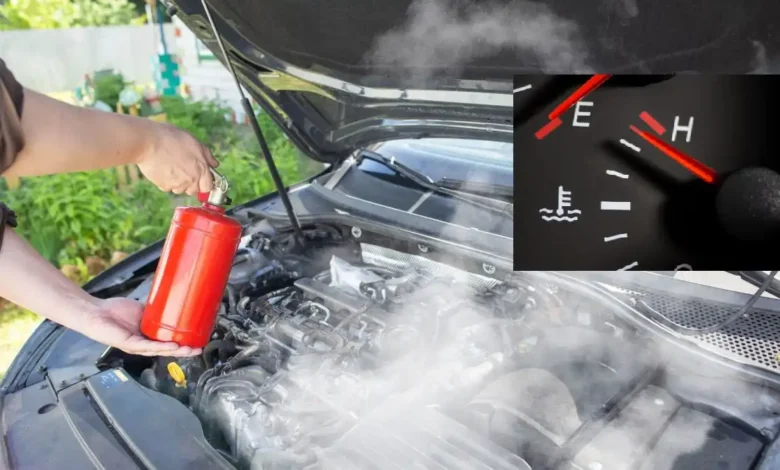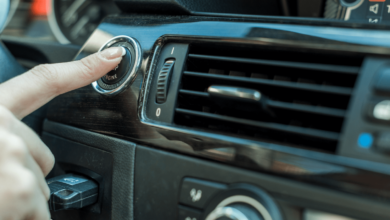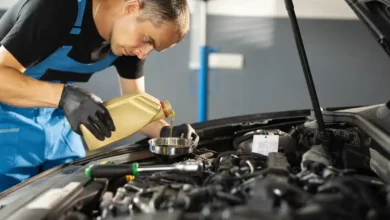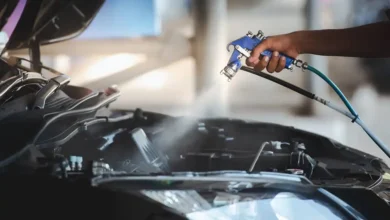
Engine overheating is no joke – it can wreak havoc on your car’s performance, safety, and even the environment.
Picture this: You’re cruising down the highway, wind in your hair, music blasting, and suddenly, your car starts acting like a drama queen—smoke billows from the hood, warning lights flash, and panic sets in. What’s going on? Your engine is overheating, and it’s not a situation to take lightly.
The heart of your vehicle, the engine, operates within a delicate balance of temperature regulation. When this equilibrium is disrupted, the consequences can be severe. Engine overheating is not merely an inconvenience; it’s a red flag demanding immediate attention. Let’s delve into the causes of this critical issue.
What Triggers Engine Overheating?
Your engine is a bit like a temperamental diva—it demands the perfect conditions to perform at its best. But when those conditions are disrupted, chaos can ensue. Here are some common culprits behind engine overheating:
1. Cooling System Failure
A malfunctioning cooling system is a prime culprit behind engine overheating. This system comprises various components such as the radiator, coolant, water pump, and thermostat. If any of these fail to function correctly, the engine’s ability to dissipate heat diminishes, leading to overheating.
2. Low Coolant Levels
Coolant, also known as antifreeze, plays a pivotal role in maintaining optimal engine temperature. Insufficient coolant levels hinder the cooling process, leaving the engine vulnerable to overheating. Leaks, evaporation, or neglecting regular coolant checks can contribute to low coolant levels.
3. Faulty Thermostat
The thermostat regulates coolant flow through the engine and radiator, ensuring consistent temperature control. A malfunctioning thermostat can disrupt this process, leading to inadequate cooling and eventual overheating.
4. Engine Oil Issues
Engine oil serves as a lubricant, reducing friction and heat generated by moving parts. Inadequate oil levels or degraded oil quality can compromise lubrication, resulting in increased friction and heat buildup within the engine.
5. External Factors
External conditions such as extreme weather, heavy loads, or prolonged idling can exacerbate engine overheating. High temperatures, coupled with additional strain on the engine, can push it beyond its cooling capacity.
The Dire Consequences of Engine Overheating
So, what happens when your engine throws a heat-induced tantrum? Buckle up, because things are about to get bumpy:
1. Engine Damage
Prolonged exposure to high temperatures can cause irreversible damage to engine components. Overheating can warp cylinder heads, damage pistons, and compromise gasket integrity, leading to costly repairs or engine replacement.
2. Reduced Performance
An overheated engine operates inefficiently, leading to diminished performance and responsiveness. Power loss, rough idling, and decreased fuel efficiency are common symptoms of an overheated engine, impacting overall vehicle performance.
3. Safety Risks
Engine overheating poses significant safety hazards, especially when driving at high speeds or in heavy traffic. Sudden engine failure due to overheating can result in loss of control, accidents, and potential injury to occupants and other road users.
4. Environmental Impact
Beyond the immediate consequences, engine overheating contributes to environmental pollution. Increased emissions from an overheated engine can worsen air quality and harm the ecosystem, perpetuating a cycle of environmental degradation.
Preventive Measures: Safeguarding Against Engine Overheating
Now that you know the ins and outs of engine overheating, it’s time to play defense. Here are some tips to keep your engine chill:
1. Regular Maintenance
Routine maintenance is essential for preventing engine overheating. Schedule regular inspections and servicing of the cooling system, including coolant checks, thermostat inspection, and radiator flushes, to ensure optimal performance.
2. Monitor Coolant Levels
Monitor coolant levels regularly and top up as needed to maintain the recommended level. Address any leaks promptly and ensure proper coolant circulation within the system to prevent overheating.
3. Check Engine Oil
Regularly check engine oil levels and quality, adhering to the manufacturer’s recommendations for oil change intervals. Clean, high-quality oil is essential for proper lubrication and heat dissipation within the engine.
4. Maintain Airflow
Ensure adequate airflow to the engine by keeping the radiator and cooling fins clean and free from debris. Proper ventilation is crucial for efficient heat dissipation, especially during hot weather or heavy-duty driving conditions.
5. Avoid Overloading
Avoid overloading your vehicle or towing heavy loads beyond its capacity, as this places additional strain on the engine and cooling system. Distribute weight evenly and avoid prolonged idling to minimize heat buildup.
Conclusion
Engine overheating is a serious issue with far-reaching consequences for vehicle performance, safety, and the environment. By understanding the causes and implementing preventive measures, drivers can safeguard against the detrimental effects of engine overheating. Regular maintenance, monitoring coolant levels, checking engine oil, maintaining airflow, and avoiding overloading are key steps in ensuring optimal engine performance and longevity. Stay vigilant, address any warning signs promptly, and prioritize the health and efficiency of your vehicle’s engine to avoid the costly repercussions of overheating.
We hope you found this article helpful. If you did, be sure to check out our blog for more great content like this.





